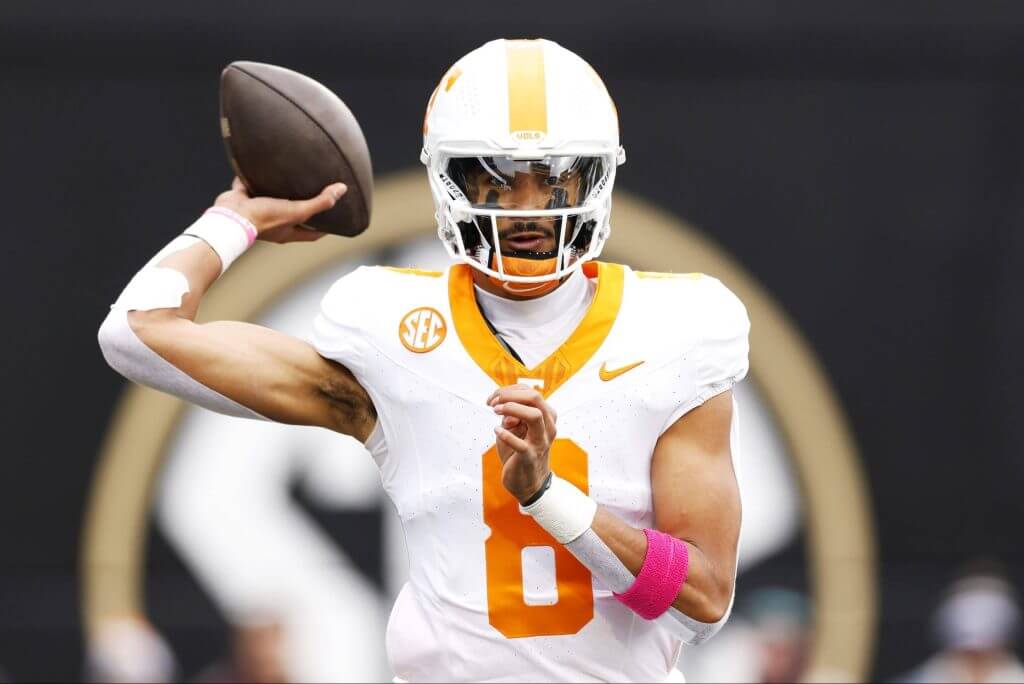
Four possible solutions to stop the Nico Iamaleava situation from repeating itself
Kirby Smart arrived at the podium on Saturday afternoon, expecting to talk about his Georgia football team. Instead, he was pounded with questions about the big news of the day — quarterback Nico Iamaleava and Tennessee parting ways amid a contract dispute — and what it all means for college sports.
Advertisement
Smart, like many in college football, showcased a sense of helplessness.
“It’s been spiraling, and it’s continuing to spiral,” Smart said. “So I don’t know what reins it in. I don’t know if there’s anything anybody can do to rein it in. It is what it is.”
Still, this might be the central question going forward amid the Iamaleava saga: How do schools stop this from happening? For many, this is another death rattle for college sports, a sign of what name, image and likeness money and unlimited transferring have wrought. But for others, it could be an opportunity for solutions.
The contract question
Unlimited transferring, the ability of players to leave for another school after every season — even every semester — has been a sore point for several years. Schools thought they were getting a handle on it by signing players to multiyear contracts through their collectives, including deals that called for players to owe money if they left.
Advertisement
The problem here is Iamaleava did have a contract: This was supposed to be the final year of a four-year deal he signed with Tennessee before his senior year of high school. Iamaleava reportedly just wanted more money after, among other things, seeing what Carson Beck got from Miami to transfer this year (reportedly $4 million). Technically, it would seem Tennessee could hold him for breach of contract. But it appears the school was just ready to move on, let Iamaleava go and save the $2.2 million it would have owed him.
Perhaps this situation causes schools and collectives to bargain harder for language in their player contracts. But this shows that multiyear contracts aren’t a perfect solution. The NFL and pro sports have contract holdouts, but they’re fairly rare because players have less leverage: Their teams can trade them, or they can just not play. The players can’t leave for another team.
That points to the big difference between the pros and colleges.
The spring portal
The existence of the spring transfer portal window offers leverage to players. As long as there is somewhere to go, a player like Iamaleava can get out of a contract and find somewhere else that will pay more.
Advertisement
In this case, his options are diminished because of the SEC rule preventing players from transferring within the conference after the winter portal window (they can still do it, but they have to sit out the next season). Still, Iamaleava has fewer options, but he still has options outside the SEC.
This is one reason coaches have been pushing to get rid of the spring transfer window. This news will super-charge those efforts, which already had momentum and might have just been put off a year, waiting for the House vs. NCAA case settlement (the roster limits in the settlement are leading to cuts, thus the need to keep the spring window open for players to find places to go).
Speaking in February, SEC commissioner Greg Sankey said the question on the two portal windows had to take into account what the coaches want but also “what’s a responsible system for recognizing that transfers are going to take place, but it ought to happen in an appropriate time period and provide people opportunities for consideration.”
Sankey added that a new economic model is coming “that may change some things this season.” That’s because of revenue sharing and the expected settlement in the House case. But as Smart pointed out on Saturday, anybody hoping for that to solve everything is delusional.
Advertisement
“I don’t know that the House settlement is going to have any effect on the flow of players because that’s not really what the House settlement is meant to do,” Smart said. “It could increase it if more teams have money. I think it’s hard to say.”
Getting rid of the spring window will hurt some players, such as those who go through spring practice and don’t like where they are on the depth chart but have to stick around for the season. So, ditching the spring window could lead to a legal challenge, and those don’t usually go well for the NCAA. An example was when Tennessee sued the NCAA for investigating the Iamaleava recruitment due to the NIL contract.
Hence, what the leaders in college sports want and hope this provides the ammunition to get.
Federal legislation
This has been the north star for college administrators for several years, and so far, they haven’t gotten it. But they remain adamant that some federal law is needed to protect them from legal challenges and allow the NCAA to regulate itself again.
Advertisement
What that federal legislation would look like is a larger question for a larger story. However, in the context of the Iamaleava situation, could it be as specific as a law saying the NCAA can make and enforce its own transfer rules? Perhaps saying that if players don’t transfer by January, they can’t play somewhere the next year?
“The NCAA could get some sort of limited antitrust exemption that allows them to sort of maintain eligibility rules without being sued every time they try to put one out,” said Josh Nadreau, an employment lawyer who has worked with several schools. “It’s impossible to regulate in any meaningful way when everything is being alleged to be an antitrust violation.
“And under antitrust law, they are (violations); these are restraints on trade. Where do we draw that line? Someone needs to start looking primarily at the player eligibility and mobility rules, because right now, it’s not working. And you’re starting to see that from coaches now, too: ‘We need some level of control.’ ”
There is a belief within college administrators that Congress could pass a law along those lines. Of course, any law could be challenged and overturned by a court if it is found to be unconstitutional, as Nadreau acknowledged, on equal protection grounds. The NCAA and college administrators seem willing to take that chance. But that chance leads to another solution, which seems the most unlikely, or at least further down the line.
Employment, collective bargaining
This is what pro sports have and what allows teams to have leverage over players under contract. It allows players other benefits and freedom of movement because basic rules are negotiated between the league and a union. Rules that are collectively bargained are largely free from court jurisdiction. It’s why college football players have to wait three years out of high school to enter the NFL Draft. It’s why rookie contracts are a set amount and why there are professional salary caps: because unions agreed to all these rules.
Advertisement
For that reason, one might look at the unregulated world of NIL and transferring and wonder why the NCAA and college leaders don’t seek out this solution. But this is a third rail for them, especially since they tie it to athletes becoming employees, another subject for a larger story. So for now, college administrators have all their hopes on federal legislation, as well as some parts of the House settlement.
But much like NIL, unlimited transferring and other changes, employment could be forced upon the NCAA. The next big case in the system is Johnson vs. NCAA, which is about whether athletes are employees. However, even that is not going to trial anytime soon, not this calendar year, at least.
Thus, the solutions to all this remain a big uncertainty. The Iamaleava news could be a flashpoint that results in tangible action. Or it could be just another in a long list of headaches for college football, surely to be followed by more.
“Look, we live in a litigated society, so everything somebody moves, somebody else has litigation to go against it,” Smart said. “And it’s unfortunate because it’s not the college football that we all grew up watching and saw. But it’s still a really good product.”
This article originally appeared in The Athletic.
College Football, Men’s College Basketball, Women’s College Basketball, College Sports, ncaa transfer portal
2025 The Athletic Media Company
#solutions #stop #Nico #Iamaleava #situation #repeating


